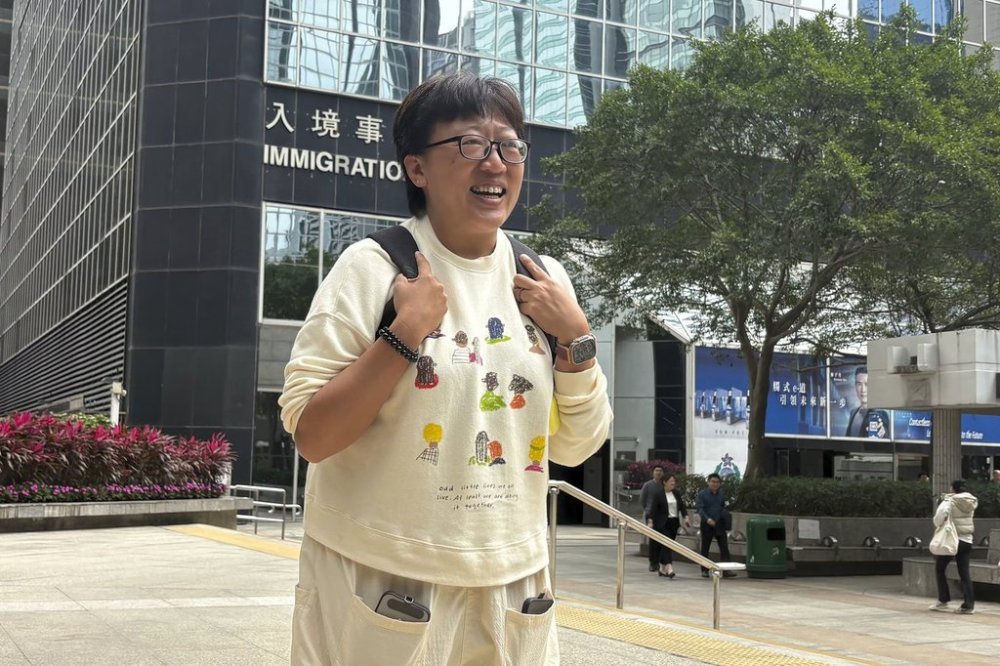A social worker who tried to mediate during the 2019 protests in Hong Kong is convicted of rioting
Advertisement
Read this article for free:
or
Already have an account? Log in here »
To continue reading, please subscribe:
Monthly Digital Subscription
$0 for the first 4 weeks*
- Enjoy unlimited reading on winnipegfreepress.com
- Read the E-Edition, our digital replica newspaper
- Access News Break, our award-winning app
- Play interactive puzzles
*No charge for 4 weeks then price increases to the regular rate of $19.95 plus GST every four weeks. Offer available to new and qualified returning subscribers only. Cancel any time.
Monthly Digital Subscription
$4.99/week*
- Enjoy unlimited reading on winnipegfreepress.com
- Read the E-Edition, our digital replica newspaper
- Access News Break, our award-winning app
- Play interactive puzzles
*Billed as $19.95 plus GST every four weeks. Cancel any time.
To continue reading, please subscribe:
Add Free Press access to your Brandon Sun subscription for only an additional
$1 for the first 4 weeks*
*Your next subscription payment will increase by $1.00 and you will be charged $16.99 plus GST for four weeks. After four weeks, your payment will increase to $23.99 plus GST every four weeks.
Read unlimited articles for free today:
or
Already have an account? Log in here »
Hey there, time traveller!
This article was published 11/03/2025 (301 days ago), so information in it may no longer be current.
HONG KONG (AP) — A social worker who tried to mediate during the height of the 2019 anti-government protests in Hong Kong was convicted of rioting Tuesday in the latest case that signaled the tough stance the authorities have taken toward political cases.
Jackie Chen was part of a group of social workers who often carried a loudspeaker seeking to mediate between police and protesters during the social unrest. She was freed at her first trial in September 2020, but the secretary of justice appealed and a court ordered a retrial by another judge.
In the retrial, the prosecution accused Chen, who used a loudspeaker to ask police officers to calm down and not to use their guns to fire non-lethal bullets, of participating in a riot during a protest in August 2019. Chen pleaded not guilty.

Judge May Chung wrote in her verdict that Chen had continuously shouted unfounded accusations against the police and suggested the officers’ actions involved the use of excessive force or were too rapid. Chen had used her social worker role, claiming to be “safeguarding justice,” to back the protesters, the judge said.
Chung ruled that the only reasonable inference was that Chen intended to participate in the riot.
“Through the aforementioned means to gather together with other rioters, (she) thereby encouraged other rioters to commit acts that disturb social peace,” she wrote.
Ahead of the verdict hearing, Chen took group photos with her supporters and hugged some of them outside of the district court building. Chen told reporters that she felt peaceful because she had five years to prepare for this. Regardless of the outcome, she has no regrets, she said.
“I hope all the people I know — they will live healthy, they will live happy because we still have our road to walk along,” she said.
After the judge announced the decision, she shouted that she would be OK to her supporters sitting in the public gallery.
Chen is expected to be sentenced in April. The maximum sentence for rioting in Hong Kong is 10 years, but the sentences at the district court are capped at seven years.
Chen could also lose her license. Last year, the government introduced amendments to the law that would allow the removal of a social worker’s name from the register if he or she has been convicted of an offense that is punishable with imprisonment and may bring the profession into disrepute.
Chen’s case drew attention because of her mild role in the 2019 movement, which was the biggest challenge to the Hong Kong government since the former British colony returned to Chinese rule in 1997.
The 2019 protests were sparked by a proposed extradition law that would have allowed criminal suspects in Hong Kong to be sent to the mainland for trial. The government withdrew the bill, but the protesters widened their demands to include direct elections for the city’s leaders and police accountability.
In response, Beijing imposed a national security law to quell the unrest. Under the law, many of the city’s leading activists were prosecuted or convicted. Hong Kong government insists the law has restored the city’s stability.

